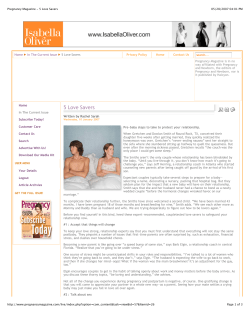
Property and the Break-up of an Unmarried Couple
ARTICLE Property and the Break-up of an Unmarried Couple TIM HART Unmarried couples frequently buy property to be their joint home. However, the assets on divorce. As the court said: Housing Regulations are such where only one of the couple is “The difficulty with which the Court is having to residentially qualified, only he or she can actually grapple in this case is one which has exercised the purchase the property if it is a freehold house or courts of the United Kingdom increasingly over the flying freehold apartment. The position is different if last 20 years – how to reach a fair result in the parties are married: in that case, the non-qualified circumstances where a couple choose to live their spouse can join in the purchase with the qualified lives together outside the institution of marriage, spouse. which the law recognises, and nonetheless seek the resolution of the law in relation to their financial This article will look at the case of Reid v. Flynn, matters when they have separated.” which recently came before the Royal Court, concerning the break-up of the long-term After a consideration of various legal principles, the relationship between unmarried partners and the court settled on the principle of ‘unjust enrichment’ dispute between them as to the division of the net as the basis for achieving a fair result between the proceeds of sale of the property which had been parties, and summarised the task for the court as bought in the sole name of the qualified partner, Mr follows: Reid, and subsequently sold by him. The court’s “The starting point is the legal interest. The Court judgment in this case provides a clear indication of then looks at whether there has been enrichment the approach to be adopted in this kind of dispute, which benefits the legal owner or owners or perhaps where there the Court does not have the wide some of them, at the expense of the claimant in a statutory powers available under the Matrimonial way that is unjustifiable.” Causes Law in the case of the division of matrimonial Applying this principle, the court considered the The Reid v. Flynn judgment contains much for parties’ original intentions, the parties’ respective lawyers to pore over and ponder. For present contributions, both monetary and in kind (bringing purposes, though, there are two important lessons. up the couple’s children), and the overall justice of First, the court has made it clear that it has a wide the case, and ordered that the net proceeds be and flexible discretion in cases such as this to ensure apportioned according to a particular formula. that the sale proceeds of property are apportioned in a fair way between previously co-habiting couples. The case is also noteworthy for the court’s approach The court made clear that the principle which it to an agreement which had been entered into applied in this case could apply to “heterosexual and between the parties at the time of the purchase of the homosexual partnerships in circumstances falling short of property. This agreement covered matters such as the those partnerships which the law formally recognises such as servicing of the mortgage (taken out in the parties’ marriage or civil partnership; de facto business arrangements joint names), the payment of outgoings relating to not formally recorded in a partnership; and platonic co- the property, the maintenance and upkeep of the habitation arrangements which might be made, whether by property and the division of the sale proceeds if the members of the same gender or not, and whether as a result property were to be sold. of family ties or friendship”. One might have thought that the court would simply Secondly, it is clear that ‘off the shelf’ agreements have enforced this agreement, which would have entered into by co-habiting couples will be viewed made it unnecessary to apply unjust enrichment with extreme scepticism by the courts. That is not to principles. However, the court took the view that say that it is not right for co-habiting couples to the agreement was meaningless in that it sought to record their intentions in writing or that no deal with the property in a vacuum, away from all documents of this nature will be given effect to by the other arrangements which the parties made with the courts. But anything which smacks of artificiality each other for the running of their home and for will be given short shrift. payment of their other outgoings. The evidence was that the agreement was drafted by the lawyers acting Co-habiting couples who have entered into in the purchase of the property without any detailed agreements of this nature would be well advised to consideration by the parties of its content and that review their agreement to make sure that they reflect from the very beginning the parties paid no attention their current circumstances and intentions. Please to it. The court was particularly scathing of the way contact Michelle Leverington on 818 163 or the agreement referred to Miss Flynn as occupying mleverington@applebyglobal.com for any advice the property as Mr Reid’s “guest”. which may be required in this area. TIM HART Partner – Property, Jersey thart@applebyglobal.com This publication is intended only to provide a summary of the subject mattered covered. It does not purport to be comprehensive or to provide legal advice. No person should act in reliance on any statement contained in this publication without first obtaining specific professional advice. June 2012 © Appleby Bermuda Guernsey Jersey Seychelles British Virgin Islands Hong Kong London Shanghai Cayman Islands Isle of Man Mauritius Zurich
© Copyright 2025





















